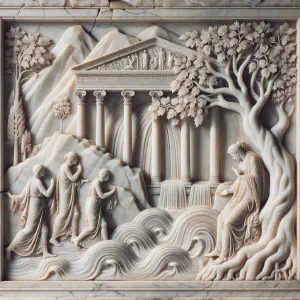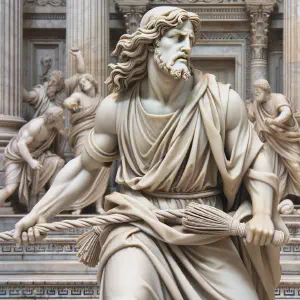Rivers of Faith
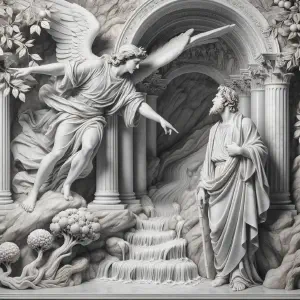
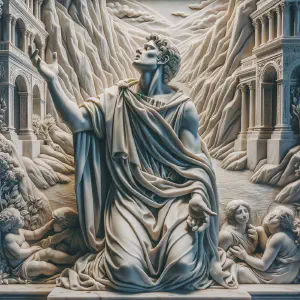
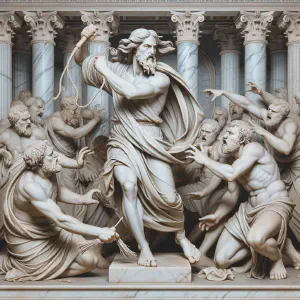
In the Gospel of John, the scene shifts to the temple in Jerusalem, where Jesus, observing the commercialization of sacred space, acts with zealous authority. He drives out merchants and money-changers, restoring the temple’s sanctity. His actions fulfill the scripture, “Zeal for your house will consume me.” Challenged by the Jews, Jesus speaks of destroying the temple and raising it in three days, a prophecy of his death and resurrection. This act of cleansing and the subsequent revelation of Jesus as the true temple underline a profound shift: from stone and mortar to the living Body of Christ, the ultimate meeting place between God and humanity.
Five Questions
What is the significance of the flowing water from the temple in Ezekiel’s vision?
The flowing water from the temple in Ezekiel’s vision represents a source of life and purification. It’s a powerful symbol of God’s grace flowing into the world, bringing life, healing, and renewal. As the water flows, it transforms the barren land into fertile ground, and even the saltwater becomes fresh. This imagery points to the transformative power of God’s presence and blessings.
How does Psalm 46 connect to this theme of God as a refuge and a source of renewal?
Psalm 46 beautifully complements the theme by portraying God as a refuge and strength in times of distress. The “stream whose runlets gladden the city of God” symbolizes God’s providence and protection. Just like the river in Ezekiel brings life and joy, the Psalmist sees God’s presence as a source of stability and renewal, ensuring that even amid chaos, the city of God remains unshaken.
In 1 Corinthians, Paul talks about believers being God’s building. How does this relate to the other readings?
Paul’s metaphor of believers as God’s building, with Jesus Christ as the foundation, ties into the theme of the temple in the other readings. It shifts the focus from a physical temple to a spiritual one. While Ezekiel sees a vision of a temple from which life-giving waters flow, and Jesus physically cleanses the temple in the Gospel, Paul reminds us that we, as believers, are now the temple of God. This calls us to live holy lives, reflecting Christ’s presence within us.
What is the significance of Jesus cleansing the temple in the Gospel of John?
Jesus cleansing the temple in John’s Gospel is significant on multiple levels. It’s an act of restoring the sanctity of the temple, a physical space meant for worship, not commerce. Symbolically, it signifies the purification and renewal that Jesus brings. His action fulfills prophecy and points towards the ultimate transformation He brings, not just to physical spaces but to the hearts of believers. It’s a powerful reminder of the need for spiritual renewal and integrity.
How do these scriptures collectively guide a believer’s life today?
Collectively, these scriptures guide believers by emphasizing the importance of spiritual renewal, the sanctity of our relationship with God, and the transformative power of His presence in our lives. They encourage us to see ourselves as part of a living, spiritual temple, with Christ as our foundation. We’re called to embrace God as our refuge, to seek spiritual purification and renewal, and to live out our faith actively, reflecting God’s love and grace in our daily lives.
Bible Study
Ezekiel 47:1-2, 8-9, 12
The angel brought me
back to the entrance of the temple,
and I saw water flowing out
from beneath the threshold of the temple toward the east,
for the façade of the temple was toward the east;
the water flowed down from the southern side of the temple,
south of the altar.
He led me outside by the north gate,
and around to the outer gate facing the east,
where I saw water trickling from the southern side.
He said to me,
“This water flows into the eastern district down upon the Arabah,
and empties into the sea, the salt waters, which it makes fresh.
Wherever the river flows,
every sort of living creature that can multiply shall live,
and there shall be abundant fish,
for wherever this water comes the sea shall be made fresh.
Along both banks of the river, fruit trees of every kind shall grow;
their leaves shall not fade, nor their fruit fail.
Every month they shall bear fresh fruit,
for they shall be watered by the flow from the sanctuary.
Their fruit shall serve for food, and their leaves for medicine.”
In this passage, the prophet Ezekiel, known for his vivid symbolic visions and role in expressing God’s message during the Babylonian exile, witnesses a life-giving stream flowing from the temple. This vision aligns with Catholic values of sanctity and reverence for God’s dwelling place, reflecting the Catholic understanding of grace as a renewing and life-sustaining force. The imagery of water, a symbol of baptism and purification, underscores the themes of cleansing and spiritual rejuvenation, resonating with the sacramental life and the doctrine of grace in Catholic teaching.
Psalm 46:2-3, 5-6, 8-9
R. (5) The waters of the river gladden the city of God, the holy dwelling of the Most High!
God is our refuge and our strength,
an ever-present help in distress.
Therefore, we fear not, though the earth be shaken
and mountains plunge into the depths of the sea.
R. The waters of the river gladden the city of God, the holy dwelling of the Most High!
There is a stream whose runlets gladden the city of God,
the holy dwelling of the Most High.
God is in its midst; it shall not be disturbed;
God will help it at the break of dawn.
R. The waters of the river gladden the city of God, the holy dwelling of the Most High!
The LORD of hosts is with us;
our stronghold is the God of Jacob.
Come! behold the deeds of the LORD,
the astounding things he has wrought on earth.
R. The waters of the river gladden the city of God, the holy dwelling of the Most High!
Psalm 46, attributed to the Sons of Korah, a group of temple singers, expresses unwavering trust in God as a refuge and strength. The psalm’s emphasis on God’s presence making the city glad connects to the Catholic value of divine providence and God’s ever-present help in distress. This aligns with the Catholic principles of reliance on God, especially during trials, resonating with teachings on God’s omnipotence and the Act of Hope among the theological virtues, acknowledging God’s ultimate control over earthly and spiritual matters.
1 Corinthians 3:9c-11, 16-17
Brothers and sisters:
You are God’s building.
According to the grace of God given to me,
like a wise master builder I laid a foundation,
and another is building upon it.
But each one must be careful how he builds upon it,
for no one can lay a foundation other than the one that is there,
namely, Jesus Christ.Do you not know that you are the temple of God,
and that the Spirit of God dwells in you?
If anyone destroys God’s temple,
God will destroy that person;
for the temple of God, which you are, is holy.
Paul the Apostle, a pivotal figure in the spread of Christianity and author of numerous New Testament letters, addresses the Corinthians about the nature of the Christian community. This passage aligns with Catholic values of community, holiness, and respect for the human body as a temple of the Holy Spirit. It reinforces the Catholic understanding of the Church as the Body of Christ, built on the foundation of Jesus’ teachings. The warning against destroying God’s temple echoes Catholic teachings on the sanctity of life and the importance of preserving both physical and spiritual well-being.
John 2:13-22
Since the Passover of the Jews was near,
Jesus went up to Jerusalem.
He found in the temple area those who sold oxen, sheep, and doves,
as well as the money-changers seated there.
He made a whip out of cords
and drove them all out of the temple area, with the sheep and oxen,
and spilled the coins of the money-changers
and overturned their tables,
and to those who sold doves he said,
“Take these out of here,
and stop making my Father’s house a marketplace.”
His disciples recalled the words of Scripture,
Zeal for your house will consume me.
At this the Jews answered and said to him,
“What sign can you show us for doing this?”
Jesus answered and said to them,
“Destroy this temple and in three days I will raise it up.”
The Jews said,
“This temple has been under construction for forty-six years,
and you will raise it up in three days?”
But he was speaking about the temple of his Body.
Therefore, when he was raised from the dead,
his disciples remembered that he had said this,
and they came to believe the Scripture
and the word Jesus had spoken.
This passage from the Gospel of John depicts Jesus, central to Christian faith as the Son of God and Savior, cleansing the Jerusalem temple. It highlights the Catholic value of reverence for sacred spaces and the importance of pure worship, aligning with the First Commandment’s call to honor God above all. Jesus’ actions reflect a zeal for holiness and purity in worship, resonating with the Catholic focus on the integrity and sanctity of religious practices. The fulfillment of prophecy and the foreshadowing of Jesus’ resurrection tie into Catholic doctrines regarding Christ’s divinity and the significance of the Resurrection in salvation history.
Lessons
These passages invite us to reflect on the profound symbolism of the temple, not just as a physical structure, but as a representation of God’s presence and action in the world. The flowing water from Ezekiel’s temple symbolizes life, renewal, and purification, while the Psalm emphasizes God’s providence and protection. Paul reminds us of our role as living temples of God, urging us to build our lives on the foundation of Jesus Christ. In the Gospel, Jesus cleansing the temple and speaking of His resurrection teaches us about the sanctity of sacred spaces and the transformative power of Christ’s sacrifice and resurrection. Together, these readings call us to embrace renewal, uphold sanctity, trust in divine providence, and live in the hope of resurrection.
Meditation Prayer
